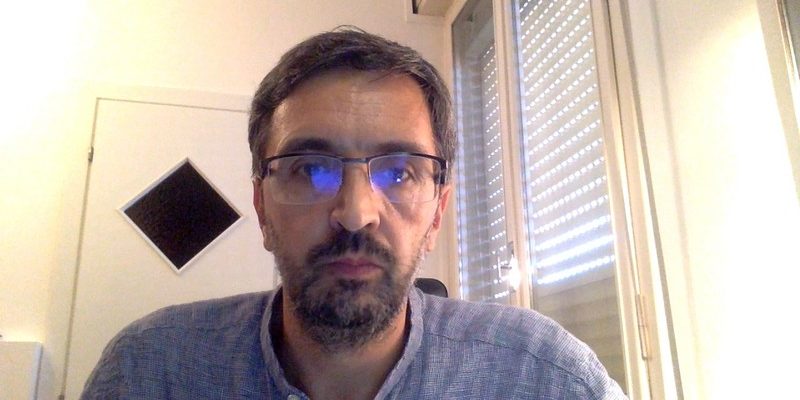First of all I wish to thank the organizers of this Conference, especially Vladimir Kršljanin, for the kind invitation to contribute but also for their long-lasting commitment to the cause of justice and truth.
Several years have passed since we met each other in the common struggle for the first time. This very year 2021 is one of important anniversaries: an anniversary helds also for the association I am representing here, the Italian Coordination for Yugoslavia (in brief: Jugocoord, www.cnj.it) which, not by chance, was also established twenty years ago (Bologna, 1st July 2001). Those who created Jugocoord had been following closely and constantly, over the previous years, the tragic phases in the dismembering of Yugoslavia which culminated in the NATO bombing of 1999. Jugocoord founders advocated the unity of that great, modern and peaceful country which was the Socialist Yugoslavia, and had subsequently stood up against the mountain of mud that the NATO system of strategic disinformation was slinging over the leadership of what remained of that country, with particular fury directed at Slobodan Milošević and his entourage. As the then Yugoslav president correctly said: “They strike Milošević to strike Yugoslavia, not the other way around”.
At the time of Milošević’ detention in The Hague, our association Jugocoord used to republish on the internet all statements and materials by ICDSM as well as by the Italian Section of the Committee, thereby denouncing the scandal of the political “trial” staged at The Hague against the figure who was most representative of both the Yugoslavist inheritance and of the interests of the Serbian nation: these are two aspects which are closely correlated and not in the least contradictory.
Our association went on spreading information and organizing events even in the darkest years that followed Slobodan Milošević assassination in The Hague prison. Finally, just in these days, Jugocoord has completed a challenging endeavour, which, in some way, represents a synthesis of the activities performed to date in Italy around these issues. I am referring to the publication of the second Italian edition of the book titled “In defence of Yugoslavia” – the only text existing in our domestic publishing panorama which has ever been dedicated to a documentation of the figure of Slobodan Milošević.
This second edition is fresh off the press so I have the pleasure of showing it to our audience as an absolute preview.
It appears fully 15 years on from the first edition, and therefore covers the further grave acts that have occurred in the meantime, including the physical liquidation of Milošević. Moreover, this volume includes a large part of the new contributions and materials published in the German editions, which now amount to five in total, and in other essays and subsequent publications. As such, this second edition differs profoundly from the first, which had been conceived at the time as an instant book to be circulated during the key moments of the so-called “trial” of Milošević, especially to offer a translation of Milošević’ Opening Declaration to the Italian public.
That the new edition is very different from the first is immediately obvious to the reader from the very size of the volume, which is much heftier than that of 2006. Indeed, while this work was sparked by Slobodan Milošević’s para-judicial situation, necessarily our gaze extends to take in the drama of Yugoslavia as a whole: that is a much broader web of issues, in which, however, Milošević and the “ad hoc Tribunal” represent the main narrative turning points and, in great measure, the synthesis.
The issues covered in the book have lost absolutely none of their relevance. The Balkan area remains highly unstable following the reckless, irresponsible operations of ethno-institutional engineering promoted by the West.
The first edition was edited by the Italian Section of the ICDSM, chaired by Miriam Pellegrini, former partisan, recently deceased. With her partner Spartaco Ferri, Miriam drafted for the occasion a brief, indignant introduction; other introductions were written by the well-known jurist Giuseppe Mattina and the famous philosopher Domenico Losurdo. None of the four are alive today: we cannot but pay further homage to them here.
In recent times, Jugocoord has intensified the initiatives around these issues: to this end, a partnership has been engaged with the SloboDA Association since 2017. 2018 saw the first edition of the “Giuseppe Torre” international contest for critical essays on the “ad hoc Tribunal” of The Hague, with awards going to Stephen Karganović and Jovan Milojevich.
A second round of the contest has concluded right this year, with the first prize given to George Szamuely. The second prize has gone ex aequo to Andy Wilcoxson and to Jonathan Rooper on behalf of the Balkan Conflicts Research Team. The quality of their essays is excellent and the organizers of the Giuseppe Torre Award decided to publish them all, together with an additional fourth one by Jovan Milojevich and introductions by the jury members Jean Toschi Marazzani Visconti and Ugo Giannangeli, in another book, which is in preparation and should be ready in about two months.
The “Torre” competition and other recently-launched initiatives are also a specific duty conferred on us by our supporter Giuseppe Torre, who passed away in 2014 having arranged a bequest to fund them. Torre expressed his ideas even more incisively with regard to the “ad hoc Tribunal” in an article of his from 2006 in which he wrote:
The Hague’s special criminal tribunal for the former Yugoslavia [is] a real instrument of warfare which cancels both international law, and the basic principles of European legal systems. Recently, it has returned not a verdict on, but rather the corpse of Slobodan Milošević.
Thank you very much again to all friends of the ICSM for this opportunity.
Andrea Martocchia, secretary of the Jugocoord association
(Speech at the International Conference MILOŠEVIĆ – AGAINST NATO CRIMES, FOR A NEW WORLD)


